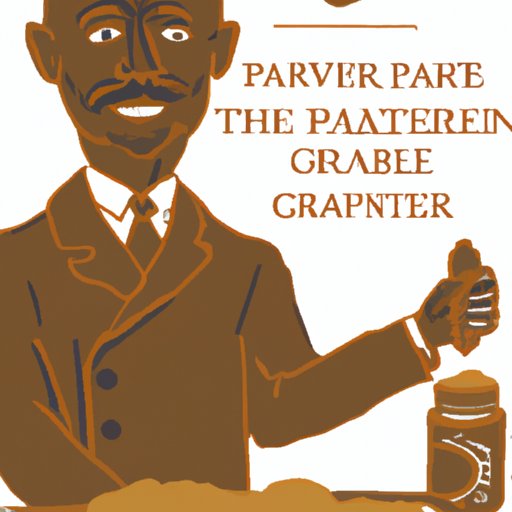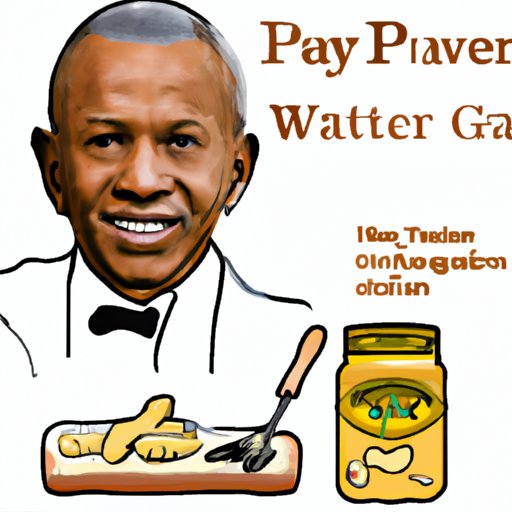Did George Washington Carver Invent Peanut Butter? The Untold Story
Let’s get right to the core of this nutty question – did George Washington Carver really invent peanut butter? Spoiler alert: the answer is more complicated than you might think. The man behind groundbreaking agricultural innovations, George Washington Carver, has often been mistakenly credited with creating this creamy, crunchy, and utterly irresistible spread. But is it true? Let’s dive deep into the history books and uncover the facts behind this sticky situation.
George Washington Carver was a genius, there's no denying that. His contributions to agriculture and science have left an indelible mark on history. But when it comes to peanut butter, the story takes a few twists and turns. In this article, we’re gonna break it down for you, so you can separate fact from fiction and give credit where it's due.
Why does it even matter? Well, peanut butter is a staple in households around the world. It’s a source of protein, energy, and joy for millions. Understanding its origins not only gives us a deeper appreciation for the product but also sheds light on the incredible legacy of George Washington Carver. So, buckle up, because we’re about to take you on a journey through time, peanuts, and one of the most misunderstood stories in history.
Read also:Garden Wedding Ceremony Los Angeles Where Love Blooms In Paradise
Who Was George Washington Carver Anyway?
Before we tackle the peanut butter question, let’s take a moment to appreciate the man behind the myth. George Washington Carver was born into slavery in Missouri sometime around 1864. Despite facing unimaginable challenges, he rose to become one of the most celebrated scientists of his time.
Carver’s work focused on improving the lives of farmers, particularly in the South. He advocated for crop rotation and promoted the use of peanuts, sweet potatoes, and other crops as alternatives to cotton. His efforts helped rejuvenate depleted soils and provided economic stability to struggling farmers.
But here’s the kicker – George Washington Carver didn’t just focus on farming techniques. He also developed over 300 products derived from peanuts, including plastics, dyes, and even fuel. While peanut butter wasn’t one of them, his work with peanuts certainly paved the way for its widespread popularity.
George Washington Carver: A Quick Bio
| Full Name | George Washington Carver |
|---|---|
| Birth Year | Approximately 1864 |
| Place of Birth | Diamond, Missouri |
| Education | Bachelor's and Master's degrees from Iowa State University |
| Notable Achievements | Developed over 300 peanut-based products and promoted sustainable farming practices |
Did George Washington Carver Really Invent Peanut Butter?
Alright, let’s cut to the chase. Did George Washington Carver invent peanut butter? The short answer is no. But that doesn’t mean his contributions to the peanut industry weren’t significant. Let’s break it down:
- Peanut butter has been around in some form for thousands of years. Ancient Aztecs and Incas were known to grind peanuts into a paste.
- In the late 19th century, a Canadian named Marcellus Gilmore Edson patented a process for making peanut butter in 1884.
- Dr. John Harvey Kellogg, the cereal magnate, also patented a method for creating peanut butter in 1895.
- George Washington Carver began promoting peanuts and developing peanut-based products in the early 20th century.
So while Carver wasn’t the first to create peanut butter, his work brought attention to the versatility of peanuts and inspired others to explore their potential.
Why Is George Washington Carver Often Credited?
George Washington Carver’s name became synonymous with peanuts because of his extensive research and promotion of the crop. He published a bulletin titled "How to Grow the Peanut and 105 Ways of Preparing it for Human Consumption," which included recipes and ideas for using peanuts in various forms. This publication helped popularize peanuts as a valuable food source.
Read also:Mead Art Museum Amherst A Hidden Gem For Art Lovers
However, it’s important to note that Carver’s focus was on agricultural innovation rather than food production. His goal was to help farmers diversify their crops and improve their livelihoods. Peanut butter just happened to be one of the many products derived from peanuts during this time.
How Peanut Butter Became a Household Staple
While George Washington Carver wasn’t the inventor of peanut butter, his efforts certainly contributed to its rise in popularity. But there’s more to the story. The commercialization of peanut butter as we know it today can be attributed to a few key players:
In 1903, Dr. Ambrose Straub patented a machine for making peanut butter, making mass production possible. By the 1920s, companies like Peter Pan and Skippy were producing peanut butter on a large scale, making it accessible to the masses.
World War II played a significant role in cementing peanut butter’s place in American culture. Soldiers were given peanut butter as part of their rations because it was nutritious, affordable, and shelf-stable. When they returned home, they brought their love for peanut butter with them, and it quickly became a staple in kitchens across the country.
The Peanut Butter Industry Today
Peanut butter is now a multi-billion-dollar industry, with countless brands and varieties available. From creamy to crunchy, natural to flavored, there’s something for everyone. According to the National Peanut Board, Americans consume approximately 700 million pounds of peanut butter each year. That’s a whole lotta love for this humble spread!
George Washington Carver’s Legacy Beyond Peanut Butter
While George Washington Carver’s name may be most closely associated with peanuts, his contributions extend far beyond the jar. Here are just a few ways his work continues to impact the world:
- Crop Rotation: Carver’s advocacy for crop rotation helped improve soil health and increase yields for farmers.
- Educator: As a professor at Tuskegee Institute, Carver mentored countless students and inspired generations of scientists.
- Environmental Stewardship: Carver was a pioneer in sustainable agriculture, promoting practices that respected and preserved the environment.
His legacy serves as a reminder of the power of innovation, perseverance, and dedication to making the world a better place.
Why We Should Celebrate George Washington Carver
Even though George Washington Carver didn’t invent peanut butter, his impact on agriculture and science is undeniable. By focusing on sustainable farming practices and promoting the versatility of peanuts, he laid the groundwork for a thriving industry that continues to thrive today.
So next time you spread peanut butter on your toast, take a moment to appreciate the man who helped bring peanuts into the spotlight. And remember, sometimes the greatest contributions aren’t always the ones we expect.
The Science Behind Peanut Butter
Let’s talk about the science behind peanut butter for a moment. What exactly makes this spread so irresistible? It all comes down to the composition of peanuts themselves.
Peanuts are approximately 25% protein and 50% fat, making them an excellent source of nutrition. When ground into a paste, the natural oils in peanuts create a creamy texture that’s hard to resist. Add a little salt or sugar, and you’ve got a flavor combination that’s pure magic.
But peanut butter isn’t just delicious – it’s also incredibly versatile. It can be used in everything from sandwiches to desserts to savory dishes. Its high fat content makes it an excellent binding agent, while its rich flavor adds depth to any recipe.
Health Benefits of Peanut Butter
Contrary to popular belief, peanut butter can be part of a healthy diet when consumed in moderation. Here are a few health benefits:
- Rich in Protein: Peanut butter is a great source of plant-based protein, making it a favorite among vegetarians and vegans.
- Packed with Healthy Fats: The monounsaturated fats in peanut butter can help lower bad cholesterol levels.
- Good Source of Vitamins and Minerals: Peanut butter contains vitamin E, magnesium, and potassium, among other nutrients.
Of course, it’s important to choose a peanut butter that’s free from added sugars and unhealthy oils to reap the full benefits.
Common Myths About Peanut Butter
There are plenty of myths surrounding peanut butter, so let’s clear a few up:
- Myth: Peanut butter is bad for you. Fact: As long as you choose a natural option and consume it in moderation, peanut butter can be a healthy addition to your diet.
- Myth: George Washington Carver invented peanut butter. Fact: Nope! But he did plenty of other amazing things.
- Myth: Peanut butter is only for kids. Fact: Peanut butter is enjoyed by people of all ages and is a staple in kitchens worldwide.
By separating fact from fiction, we can better appreciate the true value of peanut butter and the people who contributed to its development.
Where Does Peanut Butter Fit in Modern Diets?
In today’s health-conscious world, peanut butter has found a place in everything from keto diets to vegan meal plans. Its versatility and nutritional profile make it a go-to ingredient for many.
Whether you’re spreading it on toast, mixing it into smoothies, or using it as a dip for fruits and veggies, peanut butter continues to be a favorite for people of all ages and dietary preferences.
Conclusion: Separating Fact from Fiction
So, did George Washington Carver invent peanut butter? No, but his contributions to agriculture and science were nothing short of extraordinary. By promoting peanuts as a valuable crop, he helped lay the foundation for the peanut butter industry we know and love today.
As you can see, the story of peanut butter is a rich and complex one, involving many individuals and innovations over the years. But at its core, it’s a tale of creativity, perseverance, and the power of a good idea.
So next time someone asks you if George Washington Carver invented peanut butter, you’ll know the answer. And who knows? Maybe you’ll even inspire them to learn more about this fascinating piece of history.
Now, go ahead and grab a jar of your favorite peanut butter. Spread it on something delicious and take a moment to appreciate the incredible legacy behind this simple yet extraordinary spread.
Call to Action
Did you enjoy this article? Let us know in the comments below! And if you’re hungry for more history and fun facts, be sure to check out our other articles. Together, let’s keep the conversation going and spread the love for peanut butter far and wide!
Table of Contents
- Who Was George Washington Carver Anyway?
- Did George Washington Carver Really Invent Peanut Butter?
- Why Is George Washington Carver Often Credited?
- How Peanut Butter Became a Household Staple
- The Peanut Butter Industry Today
- George Washington Carver’s Legacy Beyond Peanut Butter
- Why We Should Celebrate George Washington Carver
- The Science Behind Peanut Butter
- Common Myths About Peanut Butter
- Conclusion: Separating Fact from Fiction
Article Recommendations


